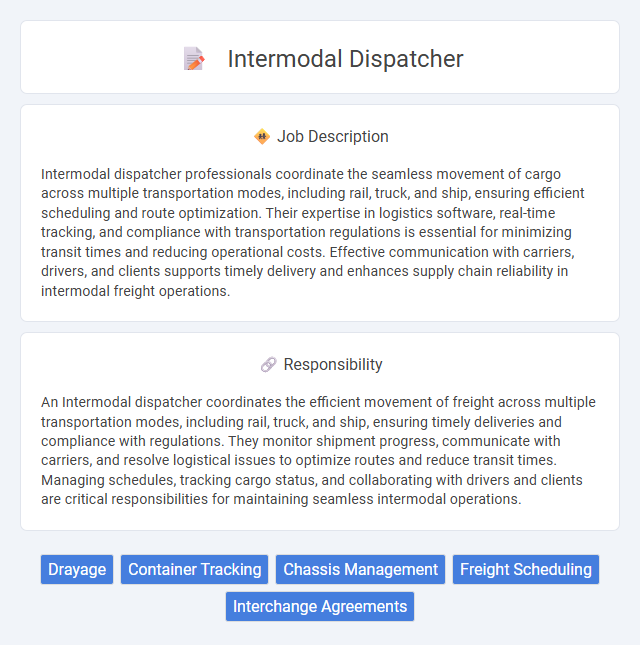
Intermodal dispatcher professionals coordinate the seamless movement of cargo across multiple transportation modes, including rail, truck, and ship, ensuring efficient scheduling and route optimization. Their expertise in logistics software, real-time tracking, and compliance with transportation regulations is essential for minimizing transit times and reducing operational costs. Effective communication with carriers, drivers, and clients supports timely delivery and enhances supply chain reliability in intermodal freight operations.
Individuals who are detail-oriented and thrive under pressure are more likely to succeed as intermodal dispatchers, as the role demands constant coordination between various transportation modes. Those with strong communication skills and the ability to multitask efficiently probably find this job suitable since it requires managing schedules, resolving delays, and liaising with drivers and clients simultaneously. People who prefer structured environments but can adapt quickly to changing circumstances may be best suited for this dynamic and fast-paced position.
Qualification
Intermodal dispatcher positions require strong logistical coordination skills, knowledge of transportation regulations, and proficiency in tracking software like TMS. Candidates typically need a high school diploma or equivalent, with preference given to those holding certifications such as Certified Transportation Dispatcher (CTD). Exceptional communication and problem-solving abilities are essential for managing schedules and resolving route issues efficiently.
Responsibility
An Intermodal dispatcher coordinates the efficient movement of freight across multiple transportation modes, including rail, truck, and ship, ensuring timely deliveries and compliance with regulations. They monitor shipment progress, communicate with carriers, and resolve logistical issues to optimize routes and reduce transit times. Managing schedules, tracking cargo status, and collaborating with drivers and clients are critical responsibilities for maintaining seamless intermodal operations.
Benefit
Intermodal dispatcher jobs likely offer significant benefits such as competitive salaries and opportunities for career growth within the logistics industry. Employees in this role may experience enhanced job stability due to the growing demand for efficient transportation coordination across multiple modes. Health insurance, retirement plans, and performance-based bonuses could also be part of the overall compensation package.
Challenge
Intermodal dispatcher roles likely involve managing complex logistics coordination across multiple transportation modes, which can present significant challenges in scheduling and real-time problem-solving. They probably face unpredictable delays and require quick decision-making to optimize freight movement while minimizing costs. Strong communication skills and adaptability may be essential to effectively handle the dynamic nature of intermodal transportation networks.
Career Advancement
Intermodal dispatcher careers offer significant opportunities for advancement through acquiring expertise in logistics coordination, supply chain management, and transportation technology systems. Professionals who develop strong analytical skills and proficiency in real-time tracking software can progress to roles such as logistics manager or operations supervisor, overseeing complex multimodal freight operations. Continuous education and certifications in transportation management enhance promotion prospects and salary growth within the intermodal logistics sector.
Key Terms
Drayage
Intermodal dispatchers specializing in drayage coordinate the short-distance transportation of shipping containers between ports, rail terminals, and warehouses, ensuring efficient cargo transfer and minimizing delays. Expertise in managing chassis allocation, real-time tracking, and compliance with DOT regulations is critical for optimizing routes and reducing operational costs. Proficiency in logistics software and strong communication skills enable dispatchers to effectively handle scheduling, driver assignments, and freight documentation within the intermodal supply chain.
Container Tracking
Intermodal dispatchers specialize in coordinating the movement of shipping containers across multiple transport modes, including rail, truck, and ship, to ensure timely delivery. Precise container tracking systems enable real-time updates on container locations, improving supply chain visibility and minimizing delays. Proficiency in logistics software and GPS tracking technology is essential for monitoring container status and optimizing route efficiency.
Chassis Management
An Intermodal dispatcher specialized in chassis management coordinates the allocation, maintenance, and movement of chassis across multiple transportation modes to ensure seamless cargo transfer. This role involves monitoring chassis availability, scheduling timely repositioning, and collaborating with trucking companies and rail yards to optimize chassis utilization. Efficient chassis management minimizes delays and reduces operational costs in intermodal freight logistics.
Freight Scheduling
Intermodal dispatchers specialize in coordinating the seamless transfer of freight across multiple transportation modes, including rail, truck, and ship, to optimize delivery times and reduce costs. Effective freight scheduling requires analyzing transit schedules, load capacities, and route efficiency to ensure timely cargo movement and minimize delays. Mastery of logistics software and real-time tracking systems enables intermodal dispatchers to adjust schedules dynamically and maintain supply chain continuity.
Interchange Agreements
Intermodal dispatchers coordinate the timely transfer of cargo between different transportation modes, ensuring compliance with Interchange Agreements to maintain operational efficiency. These agreements outline the responsibilities, liabilities, and procedures between carriers during container exchanges, minimizing disputes and delays. Mastery of Interchange Agreements enables dispatchers to streamline cargo handoffs, optimize fleet utilization, and enhance supply chain reliability.
 kuljobs.com
kuljobs.com